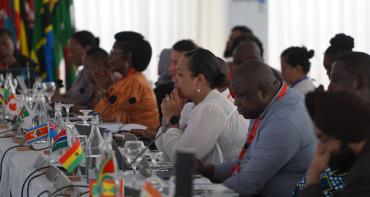The Human Rights Commission of Sri Lanka has said it has a critical role to play in national reconciliation efforts.

The Human Rights Commission of Sri Lanka has said it has a critical role to play in national reconciliation efforts. The Commission has committed to develop and implement an action plan to reflect this with the support of the ĚÇĐÄĚ˝»¨.
This outcome was the constructive end to a two-day roundtable to determine the Commission’s role in national reconciliation efforts held in Vavuniya, Sri Lanka, from 26 to 27 September.
Commission Chair Judge Priyantha Perera said: “We have had a tremendously bad experience in this country; however we must now move forward to achieve sustainable reconciliation.”
Discussions with civil society organisations and religious leaders highlighted the need for a national reconciliation process that allows for spiritual guidance and engages substantively with local communities.
Reflecting on the discussions over the two-day roundtable Michael Doherty, Director of the , said: “One of the things people will continue to have difficulty with is dealing with the past - what we need is to reconcile our differences in order to move forward.”
The view from religious leaders
Ven Attambaskada Kalyanatissa, Chief Incumbent of the Attambagaskada Sri Sudharmaramaya Buddhist temple in Vavuniya, observed that the role of religious leaders is critical in any process of reconciliation. Religious leaders could “provide ongoing spiritual guidance to those who are suffering from trauma to help them in the healing process without which there cannot be sustainable reconciliation", he said, noting that this will also help address the issue of closure.
Reverend Father Jabashelwam of the Church of Ceylon in Vavuniya affirmed this. He said religious leaders could play a significant advocacy and monitoring role in highlighting where suffering is still occurring and ensure that government and other relevant actors expedite their efforts in alleviating such suffering.
Civil society standpoint
Civil society representatives working in affected communities in Sri Lanka’s Northern Province emphasised the need for constructive engagement on the multiple dimensions of reconciliation. Dr Vinya Ariyaratne, General Secretary of the , observed that “reconciliation is multidimensional and must happen in both the social and political spheres". He said “it should be a holistic process from the bottom up. The Human Rights Commission of Sri Lanka could take the role of creating a safe space for unheard voices at the grassroots level.”
M A Lahiru Perera, Executive Director of the , said his Centre’s view was that “within a post-war environment, psychosocial rehabilitation, reconciliation, development and democracy are the most essential measures to be taken to strengthen human rights protection".
Highlighting the need for the full implementation of the national language policy, Professor P Balasundarampillai, former Vice Chancellor of Jaffna University and currently a member of the National Languages Commission said: “Effective implementation of the official languages policy is key to promoting national reconciliation. Although there are sufficient constitutional and legal provisions to safeguard language rights, there is a need to implement such provisions effectively and efficiently.”


